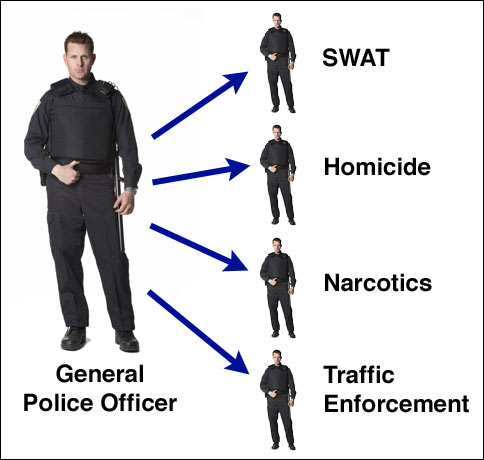Main Content
Lesson 2: TIntrodcution to Police Organization
Horizontal Complexity
At one time the majority of police officers worked in districts or precincts answering calls for services. However, now police recruits expect to come out of the police academy and go straight into a specialized division; being "just" a police officer is no longer fashionable. Police personnel want to specialize in burglary, homicide, SWAT, narcotics, traffic enforcement, or in a host of other areas. In fact, police officers will sometimes wait at the scene for another arriving officer to handle simple incidents such as a traffic accident, theft, burglary, or other cold calls that do not require specialized skills in report writing or investigations. Just as centralization was the buzzword for the early twentieth century so specialization is for beginning the twenty-first. And now as decentralization is taking hold, many believe that the age of The Uniformed Generalist will not be long in coming.

There seems to be a disconnect in thinking with regard to specialization. For example, how are specialized personnel to get the experience and training needed to function properly without the wide-ranging experience of a generalist? In the field, of course service is as line officers. In fact, police officers must be generalists. However, good arguments exists for some specialization and organization of departments into specific divisions, primary among these being that of control. Some personnel must be allocated by bureau or division to address specifics in a certain category of police problems. Second, priorities must be identified and work must be done in an organized manner. Because of the wide range of obligations given most police agencies, the commander of a division and the chief in charge of all divisions can set priorities. Last, specialization is thought to lead to expertise, and the police agency receives the benefit of efficient, knowledgeable experts by organizing according to divisions.
As time goes on, assigning the same officers to the same type of responsibilities means that these officers are the most current on information concerning these specialized problems. When specialization goes too far, communication disintegrates between divisions and individual commanders begin empire building, as one tries to outdo another in competition for perceived glory and resources. This is a common occurrence between the patrol and detective divisions.
Whereas line officers are closely supervised, expected to control the crime scene, and report the crime to the detective division, detectives are expected to give the reporting officers credit for their work and follow up the crime with analysis of investigations. However, this is not commonly the case. Over time, line officers can become jealous of the status and control that detectives enjoy, recognizing themselves as being the first on the scene but the last to receive credit and praise. Truth be told, nearly all detectives believe and act as though they are superior and neglect the patrol officers. Police administrators must be aware of these tendencies in all divisions and take consistent steps to improve communication.
Listed below are principles that can lead to administrative improvements:
- Tasks for all officers must be grounded on the belief that the job should provide new challenges and lead to the acquisition and development of professional skills;
- The optimum officer should occupy the job based on ability, credentials, and track record;
- Certain specialists are necessary but the number of specialists and their areas of specialization should be kept within reason;
- From time to time, each department must review the number of specialists in the formal organization and the need for their existence.
